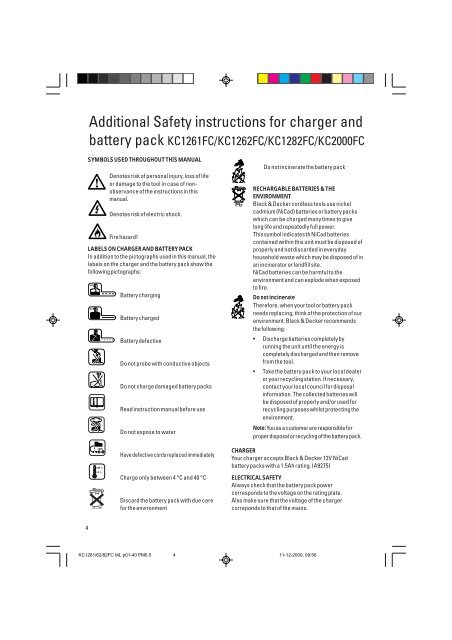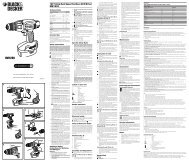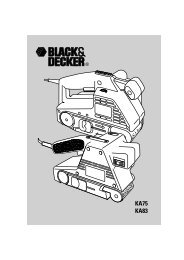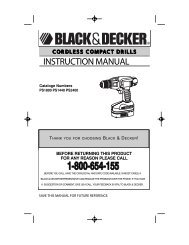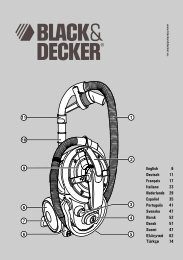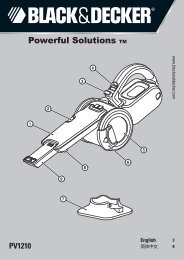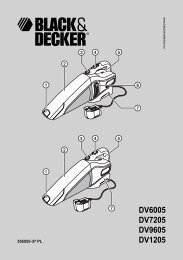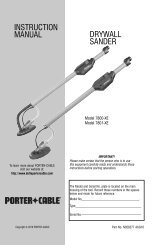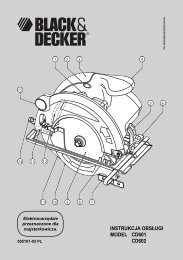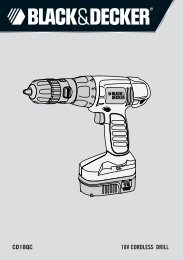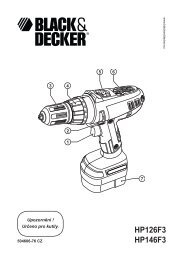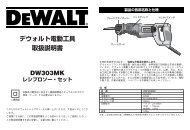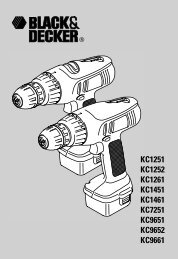KC1261FC KC1262FC KC1282FC KC2000FC - Service - Black ...
KC1261FC KC1262FC KC1282FC KC2000FC - Service - Black ...
KC1261FC KC1262FC KC1282FC KC2000FC - Service - Black ...
You also want an ePaper? Increase the reach of your titles
YUMPU automatically turns print PDFs into web optimized ePapers that Google loves.
4<br />
Additional Safety instructions for charger and<br />
battery pack <strong>KC1261FC</strong>/<strong>KC1262FC</strong>/<strong>KC1282FC</strong>/<strong>KC2000FC</strong><br />
SYMBOLS USED THROUGHOUT THIS MANUAL<br />
Denotes risk of personal injury, loss of life<br />
or damage to the tool in case of nonobservance<br />
of the instructions in this<br />
manual.<br />
Denotes risk of electric shock.<br />
Fire hazard!<br />
LABELS ON CHARGER AND BATTERY PACK<br />
In addition to the pictographs used in this manual, the<br />
labels on the charger and the battery pack show the<br />
following pictographs:<br />
100%<br />
100%<br />
+40 ˚c<br />
+4 ˚c<br />
Battery charging<br />
Battery charged<br />
Battery defective<br />
Do not probe with conductive objects<br />
Do not charge damaged battery packs<br />
Read instruction manual before use<br />
Do not expose to water<br />
Have defective cords replaced immediately<br />
Charge only between 4 °C and 40 °C<br />
Discard the battery pack with due care<br />
for the environment<br />
Pb<br />
Do not incinerate the battery pack<br />
RECHARGABLE BATTERIES & THE<br />
ENVIRONMENT<br />
<strong>Black</strong> & Decker cordless tools use nickel<br />
cadmium (NiCad) batteries or battery packs<br />
which can be charged many times to give<br />
long life and repeatedly full power.<br />
This symbol indicates th NiCad batteries<br />
contained within this unit must be disposed of<br />
properly and not discarded in everyday<br />
household waste which may be disposed of in<br />
an incinerator or landfill site.<br />
NiCad batteries can be harmful to the<br />
environment and can explode when exposed<br />
to fire.<br />
Do not incinerate<br />
Therefore, when your tool or battery pack<br />
needs replacing, think of the protection of our<br />
environment. <strong>Black</strong> & Decker recommends<br />
the following:<br />
• Discharge batteries completely by<br />
running the unit until the energy is<br />
completely discharged and then remove<br />
from the tool.<br />
• Take the battery pack to your local dealer<br />
or your recycling station. If necessary,<br />
contact your local council for disposal<br />
information. The collected batteries will<br />
be disposed of properly and/or used for<br />
recycling purposes whilst protecting the<br />
environment.<br />
Note: You as a customer are responsible for<br />
proper disposal or recycling of the battery pack.<br />
CHARGER<br />
Your charger accepts <strong>Black</strong> & Decker 12V NiCad<br />
battery packs with a 1.5Ah rating. (A9275)<br />
ELECTRICAL SAFETY<br />
Always check that the battery pack power<br />
corresponds to the voltage on the rating plate.<br />
Also make sure that the voltage of the charger<br />
correponds to that of the mains.<br />
KC1261/62/82FC ML p01-40 PM6.5 4<br />
11-12-2000, 09:56


